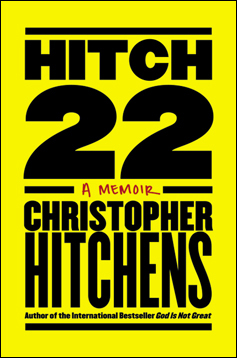 Each day leading up to the March 10 announcement of the 2010 NBCC award winners, Critical Mass highlights one of the thirty-one finalists (to read other entries in the series, click here). Today, NBCC board member Eric Banks discusses autobiography finalist Christopher Hitchens's Hitch-22: A Memoir (Twelve).
Each day leading up to the March 10 announcement of the 2010 NBCC award winners, Critical Mass highlights one of the thirty-one finalists (to read other entries in the series, click here). Today, NBCC board member Eric Banks discusses autobiography finalist Christopher Hitchens's Hitch-22: A Memoir (Twelve).
Reading the boisterous memoir Hitch-22, one can glean lessons both practical and profound that Christopher Hitchens learned from the very many people whose paths crossed his throughout his outsize life. From his future nemesis Bill Clinton, whom he knew slightly at Oxford, he discovered that if you could give a good speech or “cut any sort of figure on a podium, then you need never dine or sleep alone.” From Gore Vidal, just one of a small battalion of erstwhile comrades whose closeness evaporated with the invasion of Iraq, came the sapient advice that “one should never miss a chance either to have sex or to appear on television.” But the life lesson that was undoubtedly of the most value to Hitchens was dispensed not by a titan of print or public life but by his mother, Yvonne. “ ‘The one unforgivable sin,’ she used to say, ‘is to be boring.’ ”
It’s hard to imagine on the proof of Hitch-22, the vivacious, rambunctious tour of one of the more fascinating lives any writer has led over the last six decades, that Hitchens ever even entertained committing that particular transgression. Were the book simply a point-to-point navigation of the author’s political and social itinerary since he launched his career as a journalist-cum-polemicist in the early 1970s, it would be a compelling story. But Hitchens isn’t, of course, a mere chronicler, and Hitch-22 is no less appealing as a primer of brilliant literary style than as a record of high-altitude political wayfaring.
Style or politics, politics or style? Early on in his memoir, Hitchens establishes the double set of ledgers he’s long maintained, one column labeled “Christopher,” the other, “Chris.” At university, Chris is the soixante-huitard firebrand who racks up protest-related arrests and finds the fuse of his early militancy lit up by the then exotic-seeming word “Vietnam.” Chris is an unlikely bedfellow of Christopher, the rakish social beast who relishes living large and living well, whose admission ticket to the high table of louche old donnish queens is punched with a combination of wit, charm, and all-around bonhomie.
The particular dualism of Chris vs. Christopher seems rooted in Hitchens’s tragically mismatched parents. His father was a brave and taciturn veteran of the British navy who seemed to have lost his way in the UK that emerged after World War II. Where The Commander offered a model of stiff dignity (and for young Hitchens an emblem of the disquiet produced by repressed grievances), the author’s adored mother provided a picture of exotic beauty and the yearning for a life more exciting than she grew up knowing. (She saw to it that Hitchens would not miss out on the educational opportunities that made it possible for him to enter a world that was barred to her. If there was to be an upper crust in England, he recalls her saying, then Christopher would damn well be part of it.) She eventually left Hitchens’s father for an unbalanced former clergyman, with whom she committed suicide in Greece in late 1973.
Hitchens’s poignant portrait of Yvonne and The Commander comprises some of the most fascinating chapters in Hitch-22, as does his belated discovery a decade and a half after her death of her (and hence his own) Jewish ancestry. He’s written about this moment of “recalibration” previously, as he has done as well with many of the friends he portrays here (James Fenton, Martin Amis, Salman Rushdie) and the pivotal moments in his political evolution. For a writer who has lived such a public life and committed so many thousands of words to publications, from the New Statesman to Vanity Fair, the risk of a book like Hitch-22 is that the best stuff may seem old hat. But one of the many pleasures in reading this toothsome memoir is the intimate freshness of Hitchens’s voice. I suspect that many on the anti-war left will simply never forgive Hitchens for his voluble support in favor of the invasion of Iraq, but his own account of his thinking (and writing) on more than thirty years of Iraqi politics is difficult to put down.“The ways in which the conclusion is arrived at may be interesting, … just as it is how people think that counts for much more than what they think.” Hitch-22 shirks neither side of this apparent distinction, neither in its account of Iraq nor in telling of other places (Belfast, Buenos Aires, Sarajevo) crucial to Hitchens’s political biography. It’s his unique achievement in Hitch-22 to wrap those reflections around tributes to the value of friendship that can be howlingly funny. Hitch-22 never loses track of either—it’s a serious reflection on the joy of a mind at work and at play.
Click here to access Christopher Hitchens's website. An excerpt from Hitch-22 (via vanityfair.com) can be found here.


